Acculturation and Second Language Competencies in International Students from Korea
VerifiedAdded on 2023/06/12
|7
|1852
|219
AI Summary
This research proposal focuses on the individuals with the second language competence if they are more acculturate to new culture. The target for this research is the international students from Koreans. The study aims to examine the relationship between the acculturation and the second language competencies on the international students from Korea.
Contribute Materials
Your contribution can guide someone’s learning journey. Share your
documents today.
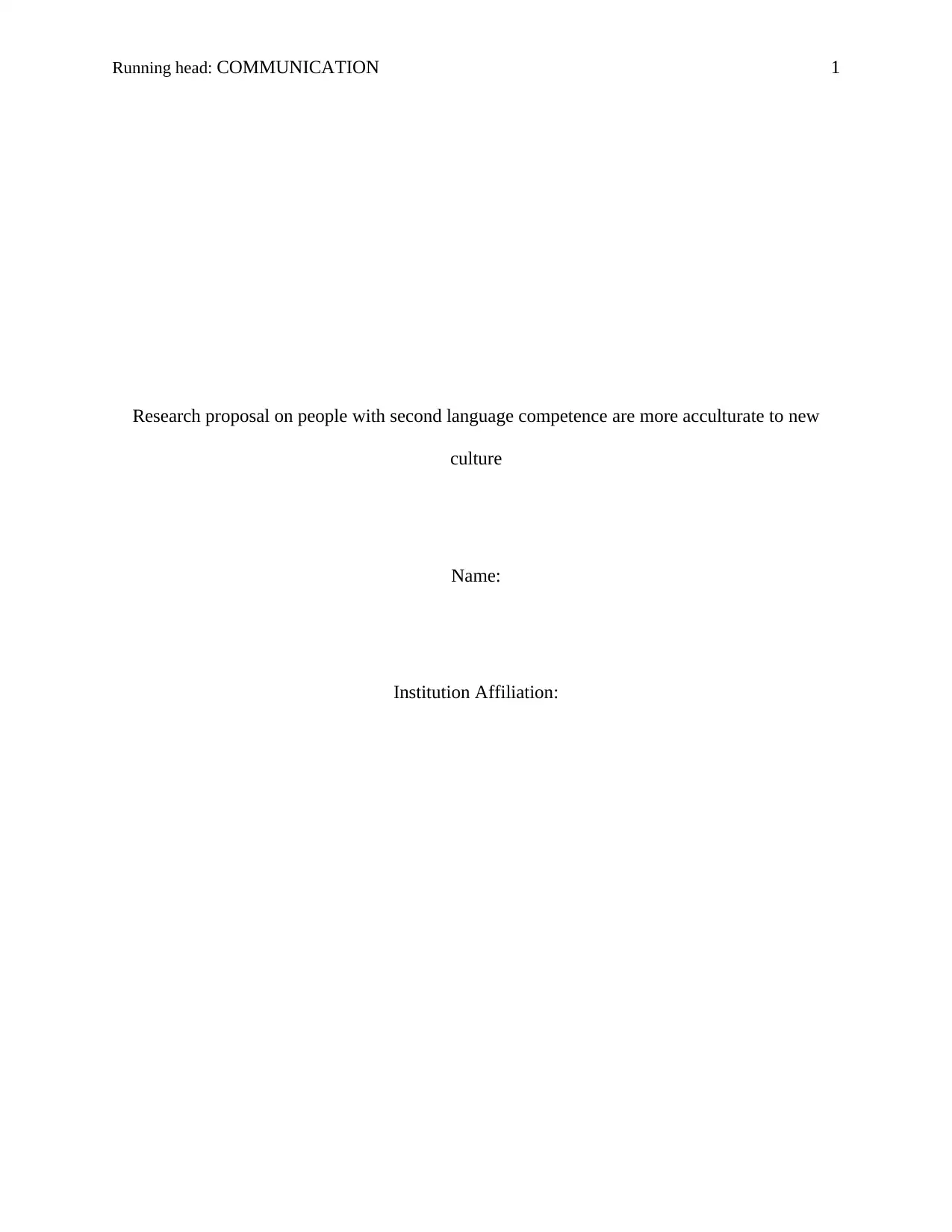
Running head: COMMUNICATION 1
Research proposal on people with second language competence are more acculturate to new
culture
Name:
Institution Affiliation:
Research proposal on people with second language competence are more acculturate to new
culture
Name:
Institution Affiliation:
Secure Best Marks with AI Grader
Need help grading? Try our AI Grader for instant feedback on your assignments.
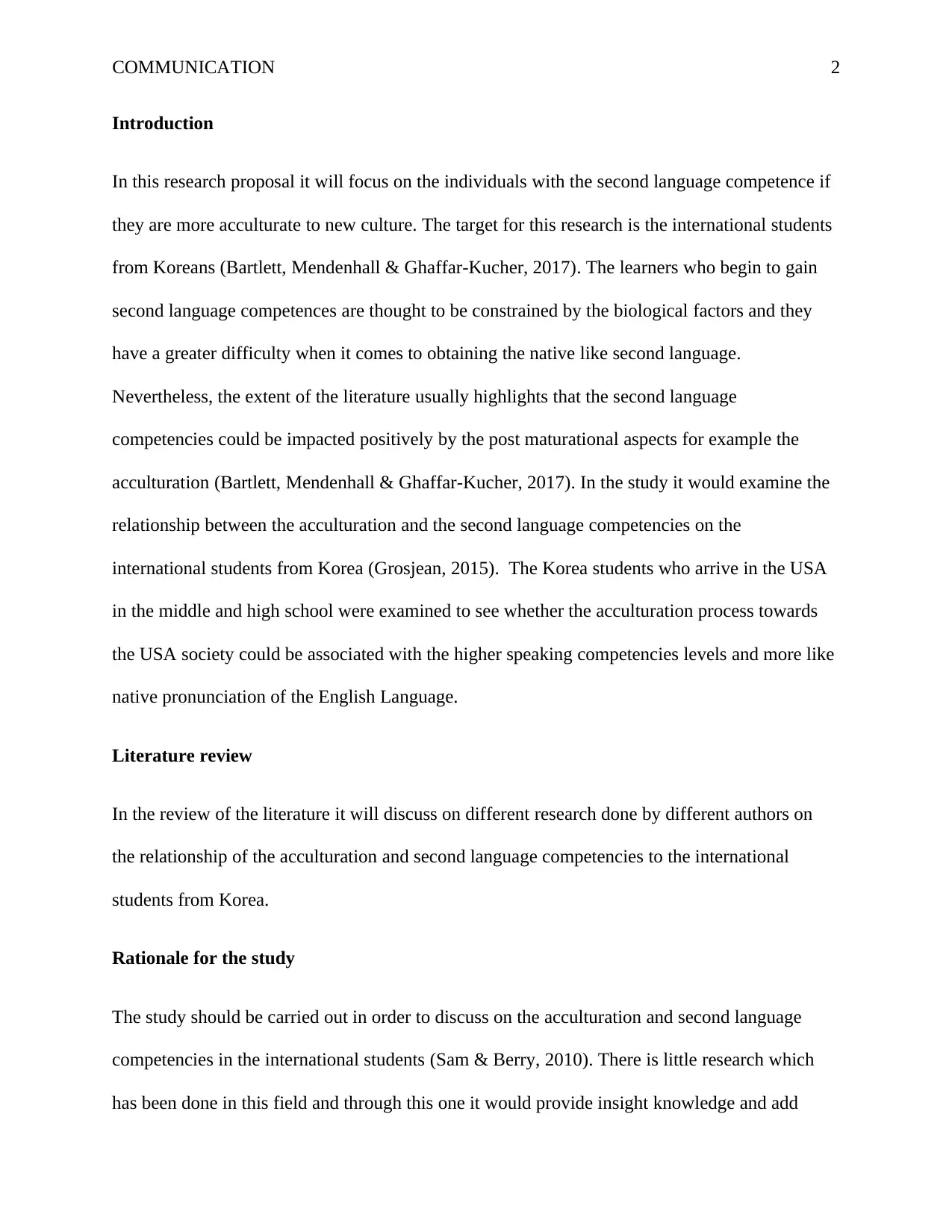
COMMUNICATION 2
Introduction
In this research proposal it will focus on the individuals with the second language competence if
they are more acculturate to new culture. The target for this research is the international students
from Koreans (Bartlett, Mendenhall & Ghaffar-Kucher, 2017). The learners who begin to gain
second language competences are thought to be constrained by the biological factors and they
have a greater difficulty when it comes to obtaining the native like second language.
Nevertheless, the extent of the literature usually highlights that the second language
competencies could be impacted positively by the post maturational aspects for example the
acculturation (Bartlett, Mendenhall & Ghaffar-Kucher, 2017). In the study it would examine the
relationship between the acculturation and the second language competencies on the
international students from Korea (Grosjean, 2015). The Korea students who arrive in the USA
in the middle and high school were examined to see whether the acculturation process towards
the USA society could be associated with the higher speaking competencies levels and more like
native pronunciation of the English Language.
Literature review
In the review of the literature it will discuss on different research done by different authors on
the relationship of the acculturation and second language competencies to the international
students from Korea.
Rationale for the study
The study should be carried out in order to discuss on the acculturation and second language
competencies in the international students (Sam & Berry, 2010). There is little research which
has been done in this field and through this one it would provide insight knowledge and add
Introduction
In this research proposal it will focus on the individuals with the second language competence if
they are more acculturate to new culture. The target for this research is the international students
from Koreans (Bartlett, Mendenhall & Ghaffar-Kucher, 2017). The learners who begin to gain
second language competences are thought to be constrained by the biological factors and they
have a greater difficulty when it comes to obtaining the native like second language.
Nevertheless, the extent of the literature usually highlights that the second language
competencies could be impacted positively by the post maturational aspects for example the
acculturation (Bartlett, Mendenhall & Ghaffar-Kucher, 2017). In the study it would examine the
relationship between the acculturation and the second language competencies on the
international students from Korea (Grosjean, 2015). The Korea students who arrive in the USA
in the middle and high school were examined to see whether the acculturation process towards
the USA society could be associated with the higher speaking competencies levels and more like
native pronunciation of the English Language.
Literature review
In the review of the literature it will discuss on different research done by different authors on
the relationship of the acculturation and second language competencies to the international
students from Korea.
Rationale for the study
The study should be carried out in order to discuss on the acculturation and second language
competencies in the international students (Sam & Berry, 2010). There is little research which
has been done in this field and through this one it would provide insight knowledge and add
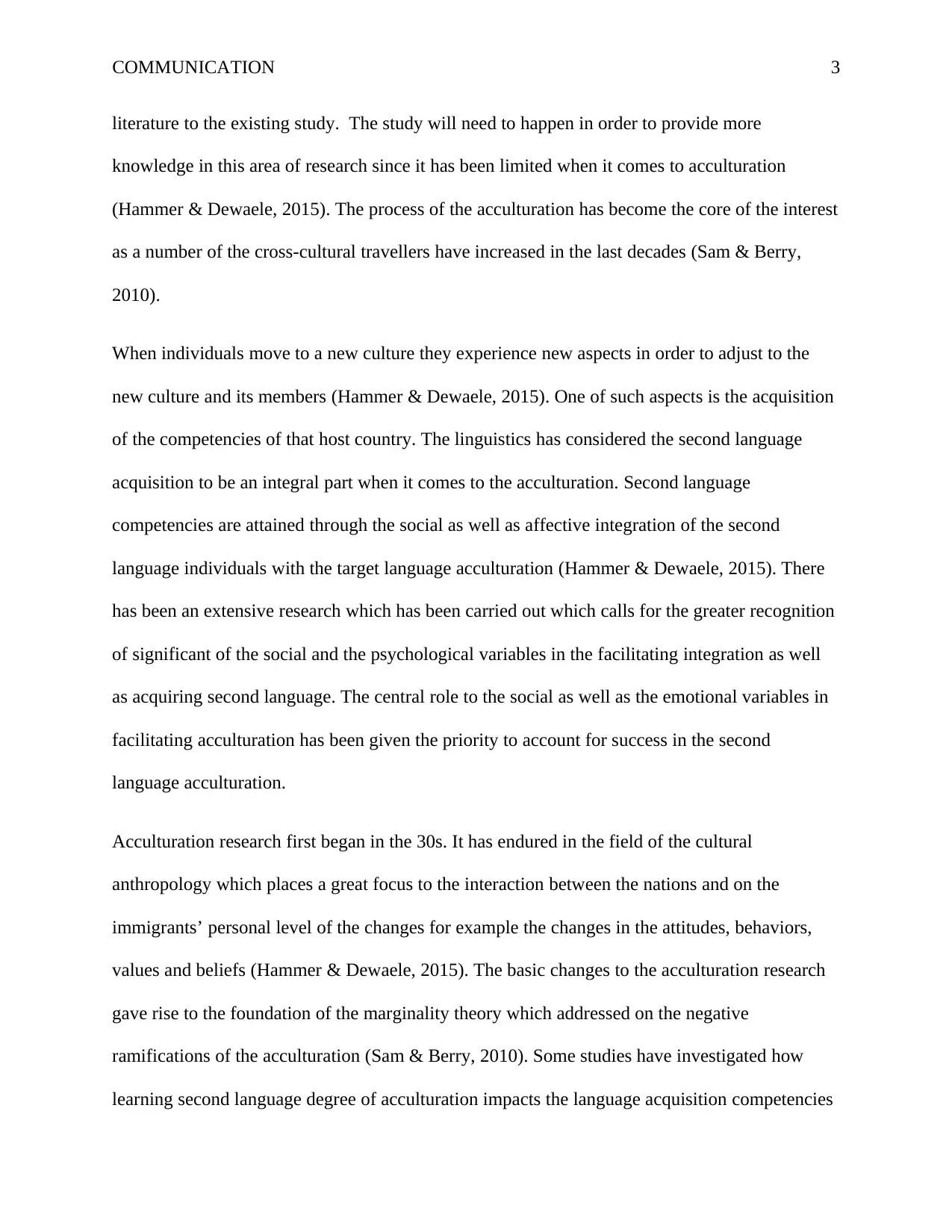
COMMUNICATION 3
literature to the existing study. The study will need to happen in order to provide more
knowledge in this area of research since it has been limited when it comes to acculturation
(Hammer & Dewaele, 2015). The process of the acculturation has become the core of the interest
as a number of the cross-cultural travellers have increased in the last decades (Sam & Berry,
2010).
When individuals move to a new culture they experience new aspects in order to adjust to the
new culture and its members (Hammer & Dewaele, 2015). One of such aspects is the acquisition
of the competencies of that host country. The linguistics has considered the second language
acquisition to be an integral part when it comes to the acculturation. Second language
competencies are attained through the social as well as affective integration of the second
language individuals with the target language acculturation (Hammer & Dewaele, 2015). There
has been an extensive research which has been carried out which calls for the greater recognition
of significant of the social and the psychological variables in the facilitating integration as well
as acquiring second language. The central role to the social as well as the emotional variables in
facilitating acculturation has been given the priority to account for success in the second
language acculturation.
Acculturation research first began in the 30s. It has endured in the field of the cultural
anthropology which places a great focus to the interaction between the nations and on the
immigrants’ personal level of the changes for example the changes in the attitudes, behaviors,
values and beliefs (Hammer & Dewaele, 2015). The basic changes to the acculturation research
gave rise to the foundation of the marginality theory which addressed on the negative
ramifications of the acculturation (Sam & Berry, 2010). Some studies have investigated how
learning second language degree of acculturation impacts the language acquisition competencies
literature to the existing study. The study will need to happen in order to provide more
knowledge in this area of research since it has been limited when it comes to acculturation
(Hammer & Dewaele, 2015). The process of the acculturation has become the core of the interest
as a number of the cross-cultural travellers have increased in the last decades (Sam & Berry,
2010).
When individuals move to a new culture they experience new aspects in order to adjust to the
new culture and its members (Hammer & Dewaele, 2015). One of such aspects is the acquisition
of the competencies of that host country. The linguistics has considered the second language
acquisition to be an integral part when it comes to the acculturation. Second language
competencies are attained through the social as well as affective integration of the second
language individuals with the target language acculturation (Hammer & Dewaele, 2015). There
has been an extensive research which has been carried out which calls for the greater recognition
of significant of the social and the psychological variables in the facilitating integration as well
as acquiring second language. The central role to the social as well as the emotional variables in
facilitating acculturation has been given the priority to account for success in the second
language acculturation.
Acculturation research first began in the 30s. It has endured in the field of the cultural
anthropology which places a great focus to the interaction between the nations and on the
immigrants’ personal level of the changes for example the changes in the attitudes, behaviors,
values and beliefs (Hammer & Dewaele, 2015). The basic changes to the acculturation research
gave rise to the foundation of the marginality theory which addressed on the negative
ramifications of the acculturation (Sam & Berry, 2010). Some studies have investigated how
learning second language degree of acculturation impacts the language acquisition competencies
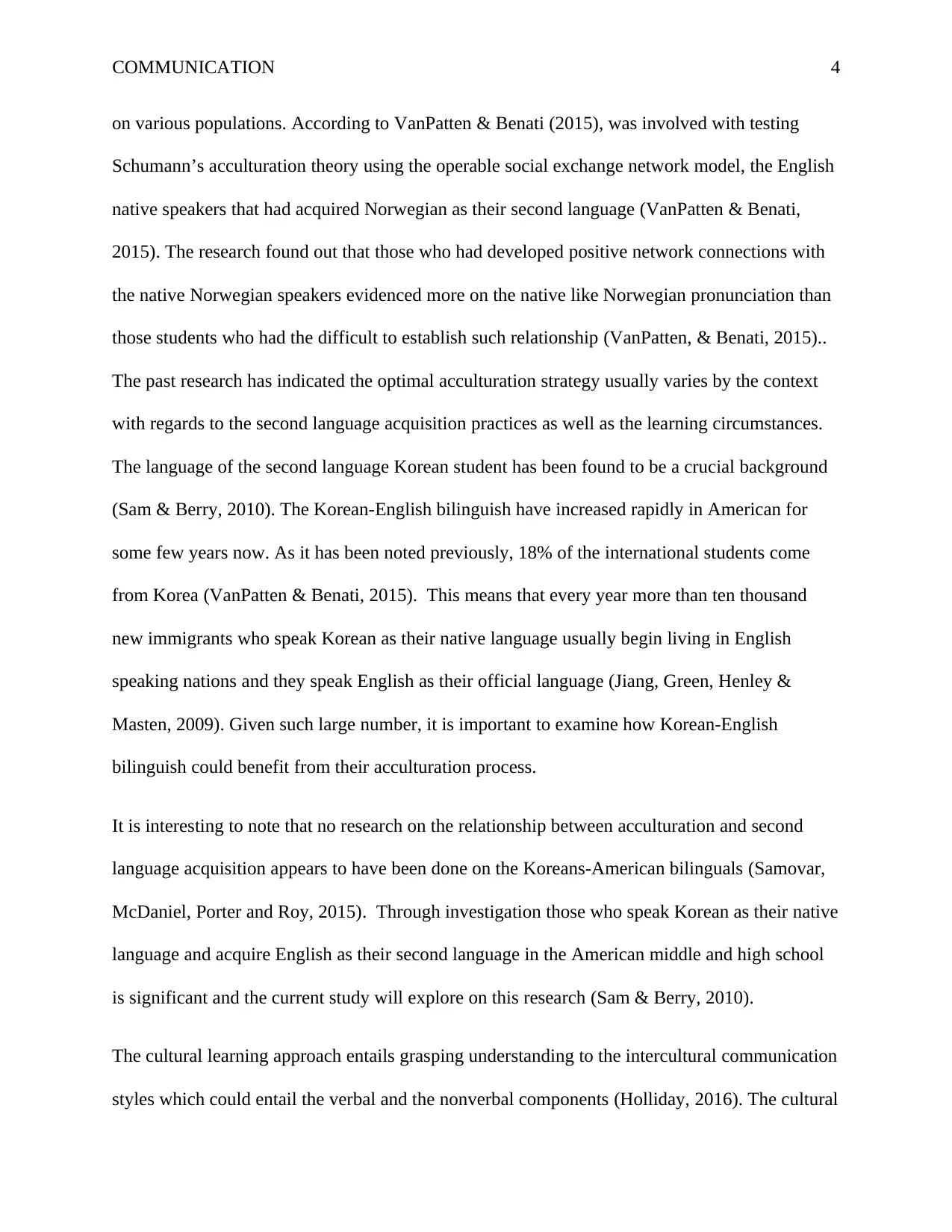
COMMUNICATION 4
on various populations. According to VanPatten & Benati (2015), was involved with testing
Schumann’s acculturation theory using the operable social exchange network model, the English
native speakers that had acquired Norwegian as their second language (VanPatten & Benati,
2015). The research found out that those who had developed positive network connections with
the native Norwegian speakers evidenced more on the native like Norwegian pronunciation than
those students who had the difficult to establish such relationship (VanPatten, & Benati, 2015)..
The past research has indicated the optimal acculturation strategy usually varies by the context
with regards to the second language acquisition practices as well as the learning circumstances.
The language of the second language Korean student has been found to be a crucial background
(Sam & Berry, 2010). The Korean-English bilinguish have increased rapidly in American for
some few years now. As it has been noted previously, 18% of the international students come
from Korea (VanPatten & Benati, 2015). This means that every year more than ten thousand
new immigrants who speak Korean as their native language usually begin living in English
speaking nations and they speak English as their official language (Jiang, Green, Henley &
Masten, 2009). Given such large number, it is important to examine how Korean-English
bilinguish could benefit from their acculturation process.
It is interesting to note that no research on the relationship between acculturation and second
language acquisition appears to have been done on the Koreans-American bilinguals (Samovar,
McDaniel, Porter and Roy, 2015). Through investigation those who speak Korean as their native
language and acquire English as their second language in the American middle and high school
is significant and the current study will explore on this research (Sam & Berry, 2010).
The cultural learning approach entails grasping understanding to the intercultural communication
styles which could entail the verbal and the nonverbal components (Holliday, 2016). The cultural
on various populations. According to VanPatten & Benati (2015), was involved with testing
Schumann’s acculturation theory using the operable social exchange network model, the English
native speakers that had acquired Norwegian as their second language (VanPatten & Benati,
2015). The research found out that those who had developed positive network connections with
the native Norwegian speakers evidenced more on the native like Norwegian pronunciation than
those students who had the difficult to establish such relationship (VanPatten, & Benati, 2015)..
The past research has indicated the optimal acculturation strategy usually varies by the context
with regards to the second language acquisition practices as well as the learning circumstances.
The language of the second language Korean student has been found to be a crucial background
(Sam & Berry, 2010). The Korean-English bilinguish have increased rapidly in American for
some few years now. As it has been noted previously, 18% of the international students come
from Korea (VanPatten & Benati, 2015). This means that every year more than ten thousand
new immigrants who speak Korean as their native language usually begin living in English
speaking nations and they speak English as their official language (Jiang, Green, Henley &
Masten, 2009). Given such large number, it is important to examine how Korean-English
bilinguish could benefit from their acculturation process.
It is interesting to note that no research on the relationship between acculturation and second
language acquisition appears to have been done on the Koreans-American bilinguals (Samovar,
McDaniel, Porter and Roy, 2015). Through investigation those who speak Korean as their native
language and acquire English as their second language in the American middle and high school
is significant and the current study will explore on this research (Sam & Berry, 2010).
The cultural learning approach entails grasping understanding to the intercultural communication
styles which could entail the verbal and the nonverbal components (Holliday, 2016). The cultural
Secure Best Marks with AI Grader
Need help grading? Try our AI Grader for instant feedback on your assignments.
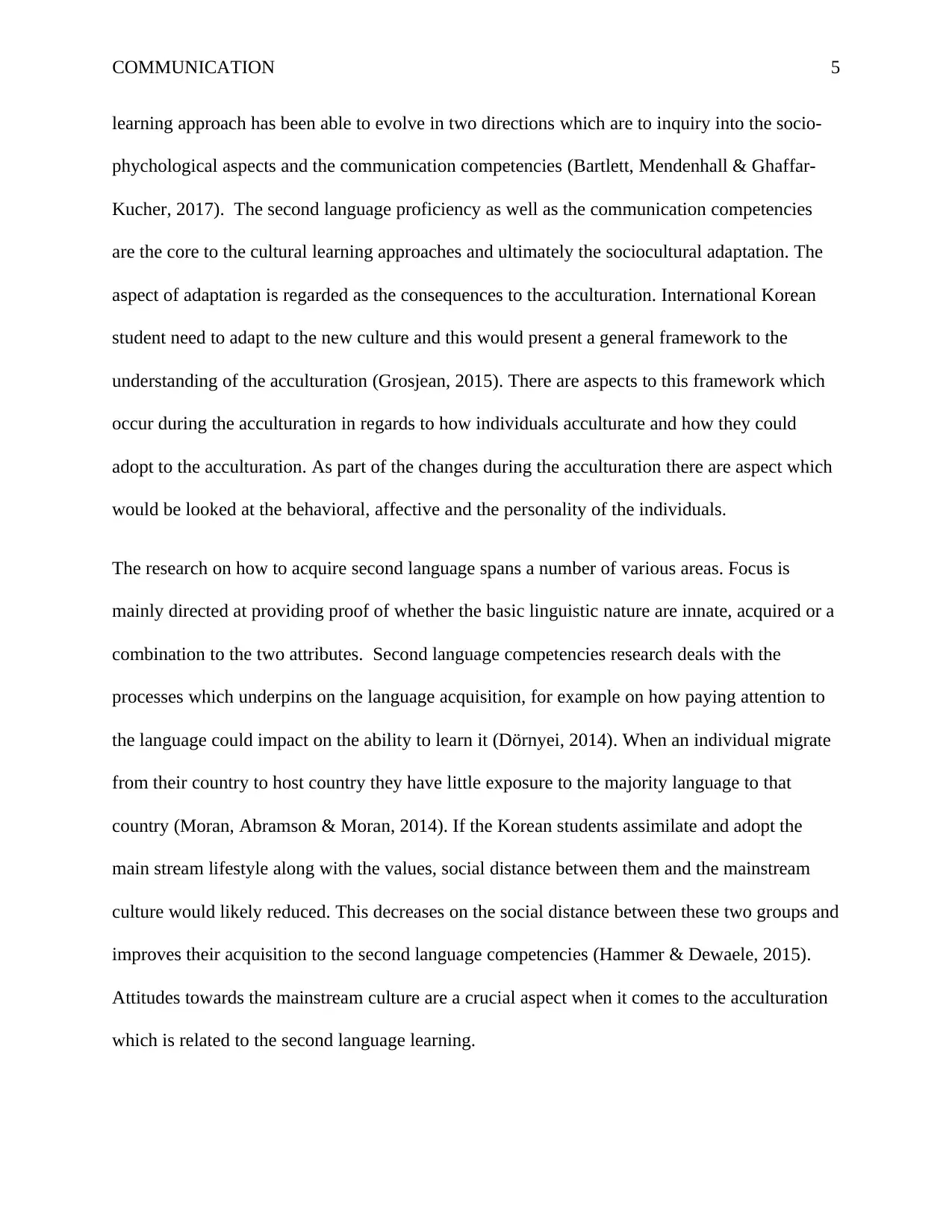
COMMUNICATION 5
learning approach has been able to evolve in two directions which are to inquiry into the socio-
phychological aspects and the communication competencies (Bartlett, Mendenhall & Ghaffar-
Kucher, 2017). The second language proficiency as well as the communication competencies
are the core to the cultural learning approaches and ultimately the sociocultural adaptation. The
aspect of adaptation is regarded as the consequences to the acculturation. International Korean
student need to adapt to the new culture and this would present a general framework to the
understanding of the acculturation (Grosjean, 2015). There are aspects to this framework which
occur during the acculturation in regards to how individuals acculturate and how they could
adopt to the acculturation. As part of the changes during the acculturation there are aspect which
would be looked at the behavioral, affective and the personality of the individuals.
The research on how to acquire second language spans a number of various areas. Focus is
mainly directed at providing proof of whether the basic linguistic nature are innate, acquired or a
combination to the two attributes. Second language competencies research deals with the
processes which underpins on the language acquisition, for example on how paying attention to
the language could impact on the ability to learn it (Dörnyei, 2014). When an individual migrate
from their country to host country they have little exposure to the majority language to that
country (Moran, Abramson & Moran, 2014). If the Korean students assimilate and adopt the
main stream lifestyle along with the values, social distance between them and the mainstream
culture would likely reduced. This decreases on the social distance between these two groups and
improves their acquisition to the second language competencies (Hammer & Dewaele, 2015).
Attitudes towards the mainstream culture are a crucial aspect when it comes to the acculturation
which is related to the second language learning.
learning approach has been able to evolve in two directions which are to inquiry into the socio-
phychological aspects and the communication competencies (Bartlett, Mendenhall & Ghaffar-
Kucher, 2017). The second language proficiency as well as the communication competencies
are the core to the cultural learning approaches and ultimately the sociocultural adaptation. The
aspect of adaptation is regarded as the consequences to the acculturation. International Korean
student need to adapt to the new culture and this would present a general framework to the
understanding of the acculturation (Grosjean, 2015). There are aspects to this framework which
occur during the acculturation in regards to how individuals acculturate and how they could
adopt to the acculturation. As part of the changes during the acculturation there are aspect which
would be looked at the behavioral, affective and the personality of the individuals.
The research on how to acquire second language spans a number of various areas. Focus is
mainly directed at providing proof of whether the basic linguistic nature are innate, acquired or a
combination to the two attributes. Second language competencies research deals with the
processes which underpins on the language acquisition, for example on how paying attention to
the language could impact on the ability to learn it (Dörnyei, 2014). When an individual migrate
from their country to host country they have little exposure to the majority language to that
country (Moran, Abramson & Moran, 2014). If the Korean students assimilate and adopt the
main stream lifestyle along with the values, social distance between them and the mainstream
culture would likely reduced. This decreases on the social distance between these two groups and
improves their acquisition to the second language competencies (Hammer & Dewaele, 2015).
Attitudes towards the mainstream culture are a crucial aspect when it comes to the acculturation
which is related to the second language learning.
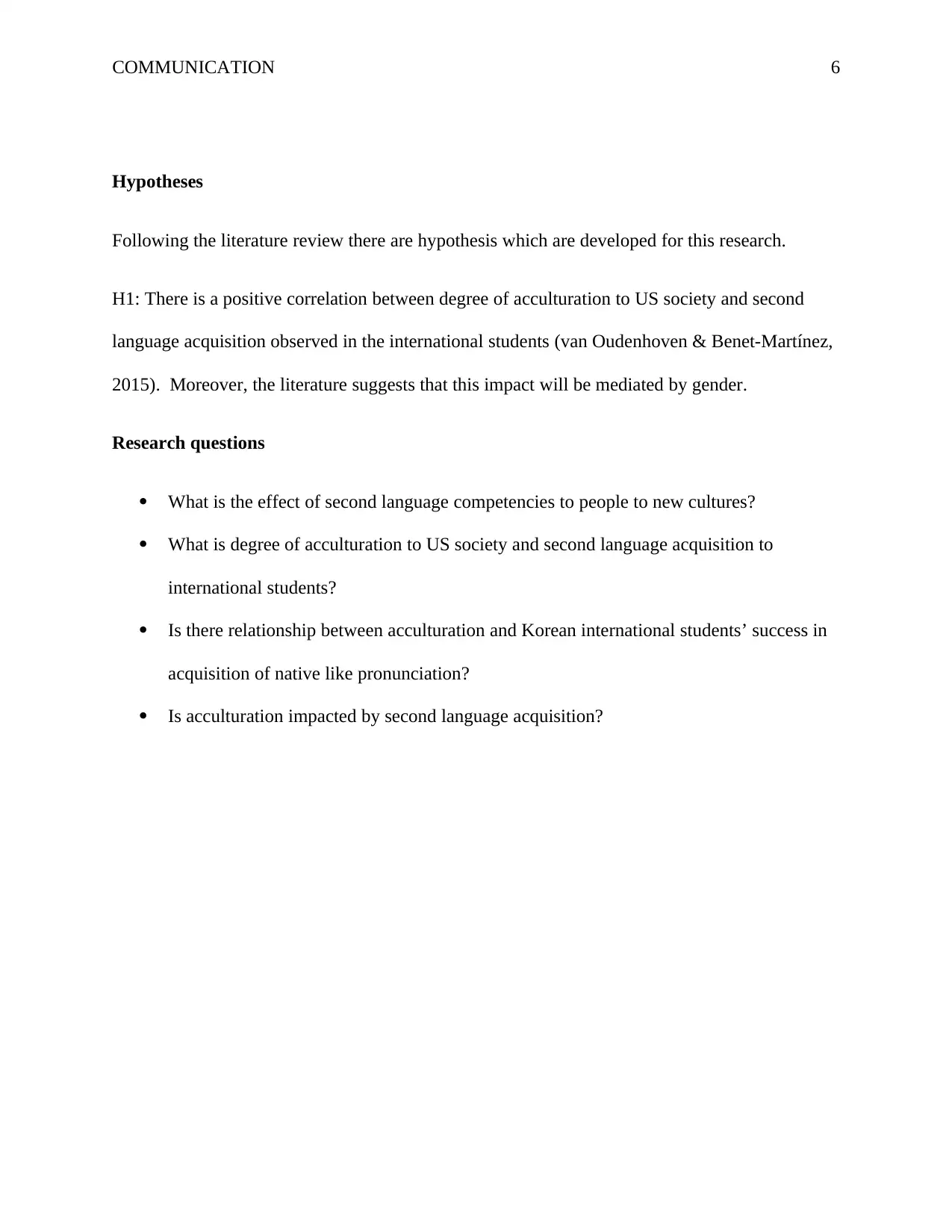
COMMUNICATION 6
Hypotheses
Following the literature review there are hypothesis which are developed for this research.
H1: There is a positive correlation between degree of acculturation to US society and second
language acquisition observed in the international students (van Oudenhoven & Benet-Martínez,
2015). Moreover, the literature suggests that this impact will be mediated by gender.
Research questions
What is the effect of second language competencies to people to new cultures?
What is degree of acculturation to US society and second language acquisition to
international students?
Is there relationship between acculturation and Korean international students’ success in
acquisition of native like pronunciation?
Is acculturation impacted by second language acquisition?
Hypotheses
Following the literature review there are hypothesis which are developed for this research.
H1: There is a positive correlation between degree of acculturation to US society and second
language acquisition observed in the international students (van Oudenhoven & Benet-Martínez,
2015). Moreover, the literature suggests that this impact will be mediated by gender.
Research questions
What is the effect of second language competencies to people to new cultures?
What is degree of acculturation to US society and second language acquisition to
international students?
Is there relationship between acculturation and Korean international students’ success in
acquisition of native like pronunciation?
Is acculturation impacted by second language acquisition?
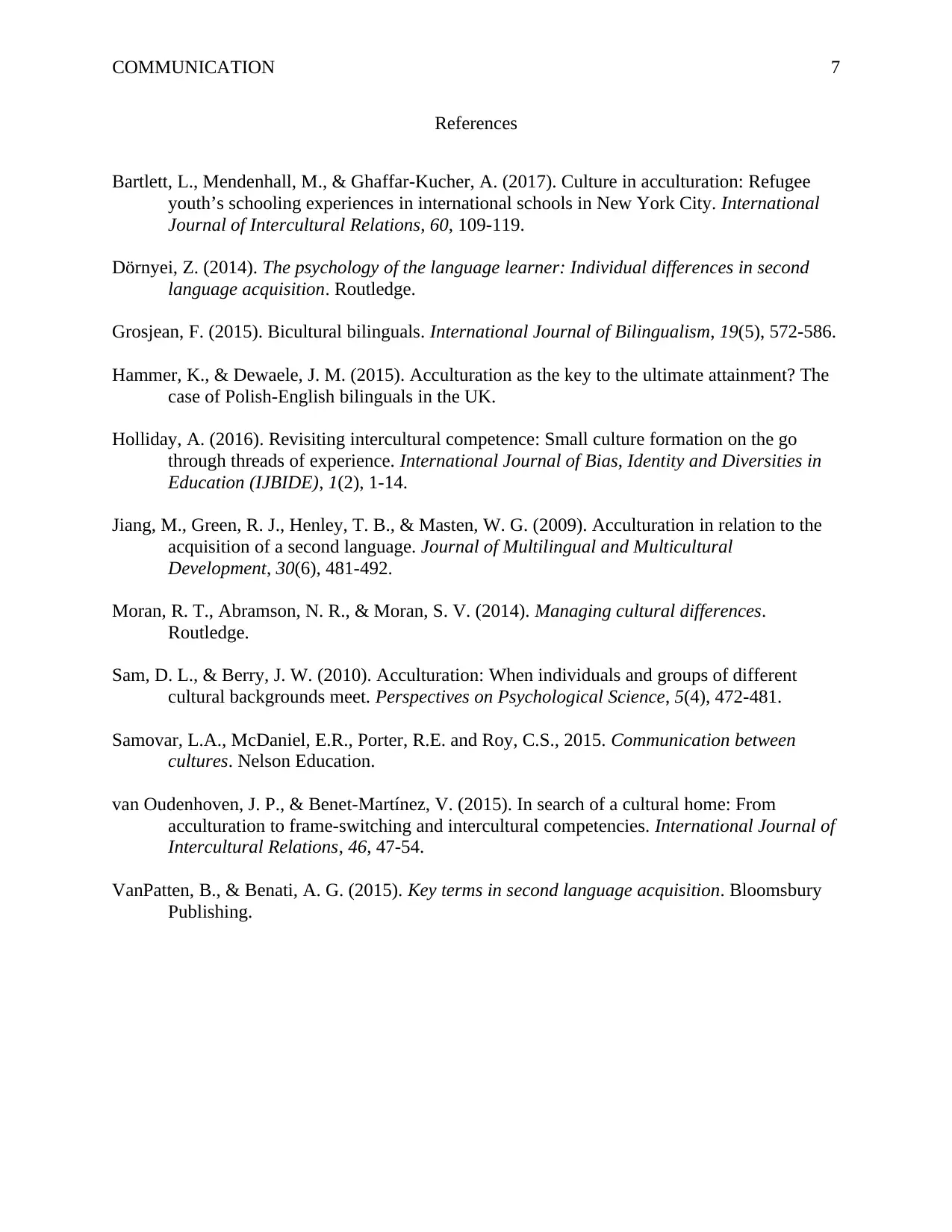
COMMUNICATION 7
References
Bartlett, L., Mendenhall, M., & Ghaffar-Kucher, A. (2017). Culture in acculturation: Refugee
youth’s schooling experiences in international schools in New York City. International
Journal of Intercultural Relations, 60, 109-119.
Dörnyei, Z. (2014). The psychology of the language learner: Individual differences in second
language acquisition. Routledge.
Grosjean, F. (2015). Bicultural bilinguals. International Journal of Bilingualism, 19(5), 572-586.
Hammer, K., & Dewaele, J. M. (2015). Acculturation as the key to the ultimate attainment? The
case of Polish-English bilinguals in the UK.
Holliday, A. (2016). Revisiting intercultural competence: Small culture formation on the go
through threads of experience. International Journal of Bias, Identity and Diversities in
Education (IJBIDE), 1(2), 1-14.
Jiang, M., Green, R. J., Henley, T. B., & Masten, W. G. (2009). Acculturation in relation to the
acquisition of a second language. Journal of Multilingual and Multicultural
Development, 30(6), 481-492.
Moran, R. T., Abramson, N. R., & Moran, S. V. (2014). Managing cultural differences.
Routledge.
Sam, D. L., & Berry, J. W. (2010). Acculturation: When individuals and groups of different
cultural backgrounds meet. Perspectives on Psychological Science, 5(4), 472-481.
Samovar, L.A., McDaniel, E.R., Porter, R.E. and Roy, C.S., 2015. Communication between
cultures. Nelson Education.
van Oudenhoven, J. P., & Benet-Martínez, V. (2015). In search of a cultural home: From
acculturation to frame-switching and intercultural competencies. International Journal of
Intercultural Relations, 46, 47-54.
VanPatten, B., & Benati, A. G. (2015). Key terms in second language acquisition. Bloomsbury
Publishing.
References
Bartlett, L., Mendenhall, M., & Ghaffar-Kucher, A. (2017). Culture in acculturation: Refugee
youth’s schooling experiences in international schools in New York City. International
Journal of Intercultural Relations, 60, 109-119.
Dörnyei, Z. (2014). The psychology of the language learner: Individual differences in second
language acquisition. Routledge.
Grosjean, F. (2015). Bicultural bilinguals. International Journal of Bilingualism, 19(5), 572-586.
Hammer, K., & Dewaele, J. M. (2015). Acculturation as the key to the ultimate attainment? The
case of Polish-English bilinguals in the UK.
Holliday, A. (2016). Revisiting intercultural competence: Small culture formation on the go
through threads of experience. International Journal of Bias, Identity and Diversities in
Education (IJBIDE), 1(2), 1-14.
Jiang, M., Green, R. J., Henley, T. B., & Masten, W. G. (2009). Acculturation in relation to the
acquisition of a second language. Journal of Multilingual and Multicultural
Development, 30(6), 481-492.
Moran, R. T., Abramson, N. R., & Moran, S. V. (2014). Managing cultural differences.
Routledge.
Sam, D. L., & Berry, J. W. (2010). Acculturation: When individuals and groups of different
cultural backgrounds meet. Perspectives on Psychological Science, 5(4), 472-481.
Samovar, L.A., McDaniel, E.R., Porter, R.E. and Roy, C.S., 2015. Communication between
cultures. Nelson Education.
van Oudenhoven, J. P., & Benet-Martínez, V. (2015). In search of a cultural home: From
acculturation to frame-switching and intercultural competencies. International Journal of
Intercultural Relations, 46, 47-54.
VanPatten, B., & Benati, A. G. (2015). Key terms in second language acquisition. Bloomsbury
Publishing.
1 out of 7
Your All-in-One AI-Powered Toolkit for Academic Success.
+13062052269
info@desklib.com
Available 24*7 on WhatsApp / Email
![[object Object]](/_next/static/media/star-bottom.7253800d.svg)
Unlock your academic potential
© 2024 | Zucol Services PVT LTD | All rights reserved.